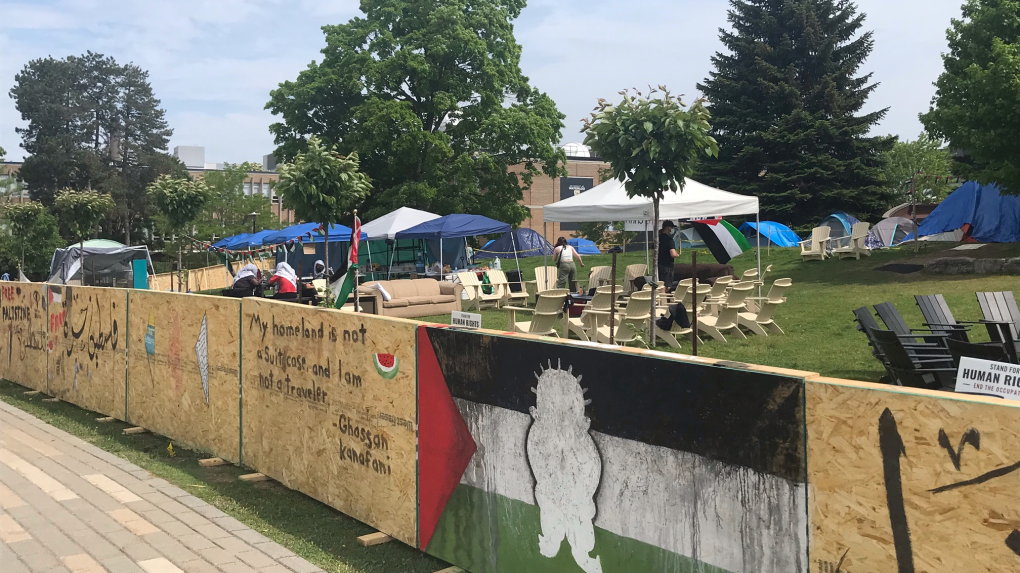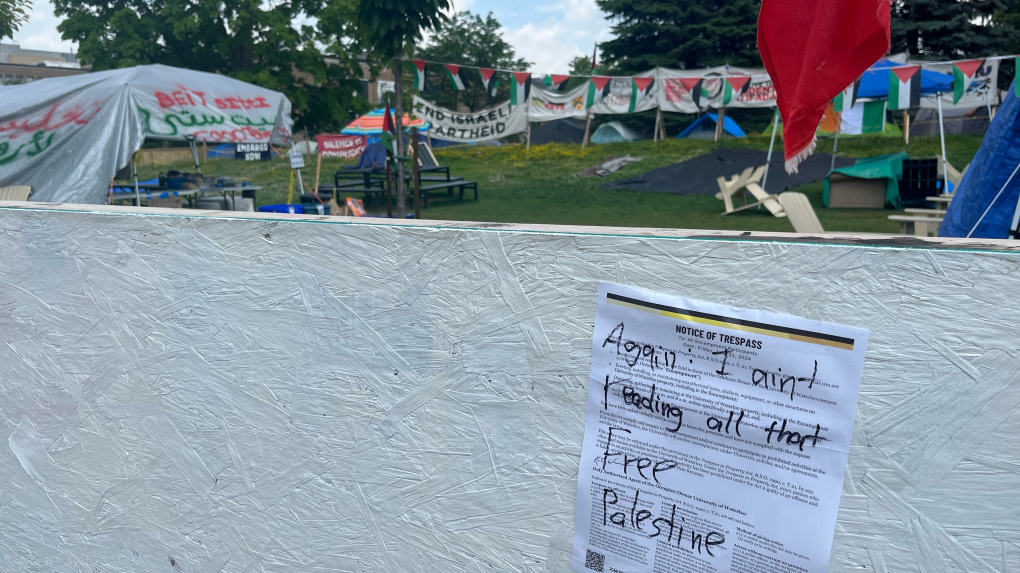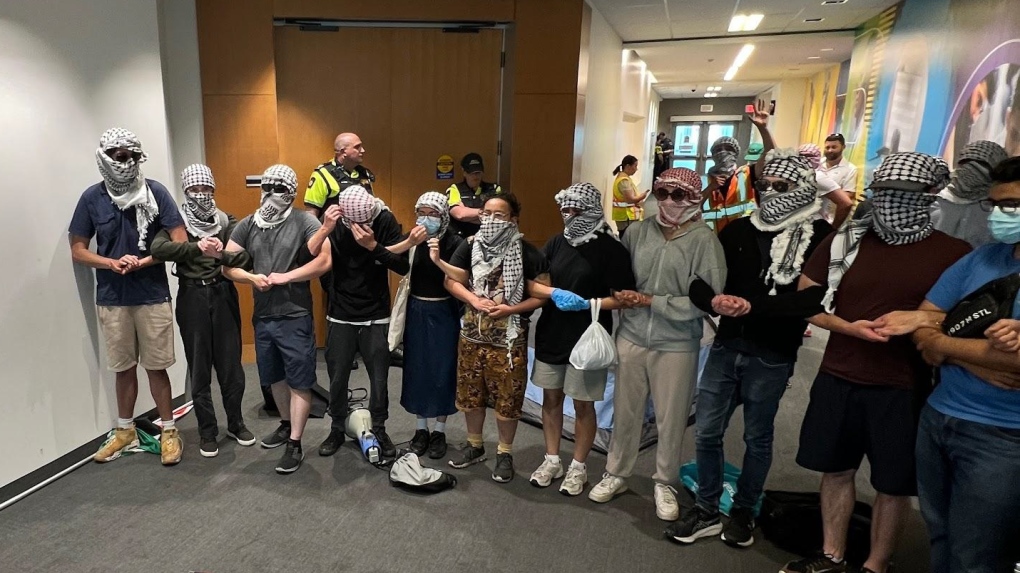University of Waterloo takes legal action to remove Occupy UW encampment
An ongoing dispute between the University of Waterloo and a pro-Palestinian encampment has turned into a legal battle.
University officials issued an official notice of trespass last week, demanding that protestors pack up and move off campus grounds.
Now they’ve taken it one step further.
The school officially filed an injunction on Tuesday, alleging encampment organizers have crossed a line – a sentiment not everyone on campus agrees with.
Statement of Claim
A copy of the injunction was also shared with CTV News. It lists seven defendants by name, as well as a John Doe, Jane Doe and “persons unknown.” The school said it has been unable to identify all members as they “cover their faces to obscure their identity” but said they include students, alumni, staff, faculty and employees, as well as members of the public have no affiliation with the University of Waterloo.
According to the statement of claim, the university is declaring $1.5 million in damages for “trespass, damage to property, intimidation and ejectment.”
They went on to explain, in an email to CTV News, that "the goal of this legal action is to bring an end to the encampment on the univeristy's campus - it's primary objective is not about damages or punishing those on Grad House Green."
The defendants are further asked to leave school property immediately and leave it in the condition it was on May 12, right before the encampment was established. It also lays out specific stipulations for demonstrators, specifically that no fences, or any other kind of structure that blocks access to campus grounds, will be permitted.
“This encampment consists of tents and structures surrounded by wooden barriers, effectively barricading a highly utilized central location on the university’s campus on the green space next to the Graduate House and preventing free access to, from, and through the site,” the injunction reads.
 Encampment at the University of Waterloo on May 22, 2024. (Chris Thomson/CTV Kitchener)
Encampment at the University of Waterloo on May 22, 2024. (Chris Thomson/CTV Kitchener)
As part of the order, the school asks that students also refrain from interfering with the university’s senate, Board of Governors, teaching and research activities, events related to university operations and regularly scheduled meetings on campus.
“The defendants have expanded their activities related to the illegal occupation within the encampment to the broader university campus, including going so far as to disrupt Needles Hall and blocking access to facilities, confining university staff and several members of its Board of Governors within parts of the building and making it impossible for them to continue their regular activities,” the injunction reads.
It also alleges demonstrators have “refused to engage in any sort of productive dialogue with the university.”
A trespass notice was posted to an encampment fence on June 21. The school claims one of the defendants wrote on it: “I ain’t reading all that. Free Palestine.” The protestors, the order explains, have made no efforts to move the encampment since notice was given.
 A trespass sign at the Occupy UW encampment on June 21, 2024. (Stefanie Davis/CTV News)
A trespass sign at the Occupy UW encampment on June 21, 2024. (Stefanie Davis/CTV News)
UW is also requesting that the Waterloo Regional Police Service, Ontario Provincial Police, or other policing units be allowed to remove protestors, objects and structures that violates the injunction.
A judge is expected to address the court order next week.
UW’s position
The University of Waterloo said it’s received a number of complaints since the encampment went up.
“We’ve had a number of people point out to us behaviour that they feel is intimidating,” Nick Manning, the school’s associate vice-president of communications, said Tuesday. “The harassment of individuals, particularly with slogans, chants and so on, has escalated over recent weeks.”
Protestors went too far, in the school’s perspective, when members disrupted a Board of Governors meeting on June 18.
“Which included bodily prevention of people entering buildings,” Manning explained. “Those types of escalations are making the encampment untenable, and that’s why we’ve needed to act.”
 Occupy UW disrupts a board of governors meeting on Tuesday, June 18, 2024. (Submitted/OccupyUW)
Occupy UW disrupts a board of governors meeting on Tuesday, June 18, 2024. (Submitted/OccupyUW)
On June 9, the university’s task force on freedom of expression and inclusive engagement published a report that reviewed existing policies and laid out guidelines for the future.
UW President Vivek Goel said in a statement the university’s decision to seek an injunction is supported by the task force’s findings.
Emmett Macfarlane, one of the contributors to that report, disagrees.
An opposing view
“My concern is that this actually flied in the face of our report,” the UW professor and task force member told CTV News.
The task force stated that there needed to be limits on protests.
“We really take an approach that protest is limited only where that freedom actually interferes with the freedom of other people to move about campus and for the university to conduct its normal work,” Macfarlane said.
But, he added, the UW encampment has not crossed that line.
“In the context of the encampment, they are occupying a grassy hill near the centre of campus. It does not even block a pathway.”
Macfarlane believes that if the university wants the encampment to move then they need to be specific about their claims.
“It has to justify these things: It has to actually provide the campus with transparency and with specific details about what is justifying the seeking of this injunction,” he explained. “The communication [Tuesday] morning simply has failed to do that.”
No response yet from protestors
CTV News reached out representatives of the encampment to get their reaction. They said they would be consulting with legal professionals before making any comment on the court order.
So far, there are no plans to move the encampment.
CTVNews.ca Top Stories

Alberta RCMP officer charged with 2 counts of sexual assault
A Leduc RCMP officer has been charged in connection with sexual assaults that happened two years ago.
Alleged gang member driving from U.S. arrested at Canadian border after making wrong turn
An alleged gang member coming from the United States was arrested at the Canadian border after reportedly making a wrong turn onto the Peace Bridge border crossing.
Trump demands immediate release of Oct. 7 hostages, says otherwise there will be 'HELL TO PAY'
President-elect Donald Trump is demanding the immediate release of the Israeli hostages still being held in Gaza, saying that if they are not freed before he is sworn into office there will be “HELL TO PAY."
Kingston, Ont. doctor in 'disbelief' after being ordered to repay $600K for pandemic vaccination payments
An Ontario health tribunal has ordered a Kingston, Ont. doctor to repay over $600,000 to the Ontario government for improperly billing thousands of COVID-19 vaccinations at the height of the pandemic.
Nova Scotia lawyer suspended following ugly courtroom fracas
A Nova Scotia lawyer who had to be restrained by deputy sheriffs during a court appearance earlier this year has lost his appeal of a suspension following the bizarre incident.
Harvey Weinstein hospitalized after 'alarming blood test,' attorney says
Harvey Weinstein was hospitalized Monday following an 'alarming blood test,' his attorney said, less than a week after he filed a legal claim alleging substandard medical care at New York City's notorious jail complex.
AC/DC announces North American stadium tour, Vancouver lone Canadian stop
Big news for AC/DC fans as the heavy metal bigwigs announced Monday they will hit the road next spring. But as of now, there’s only one Canadian show on the docket.
Negotiations between Canada Post, union still on hold
Canada Post says it's waiting for a response from the union representing some 55,000 striking workers after it offered a new framework for negotiations over the weekend.
Wind chills of -50, snowfall of up to 50 cm: Canada's weather forecast
As the second day of December unfolds, Canadians from coast to coast are experiencing a range of wintry conditions. Here's what's happening in different parts of the country.

































